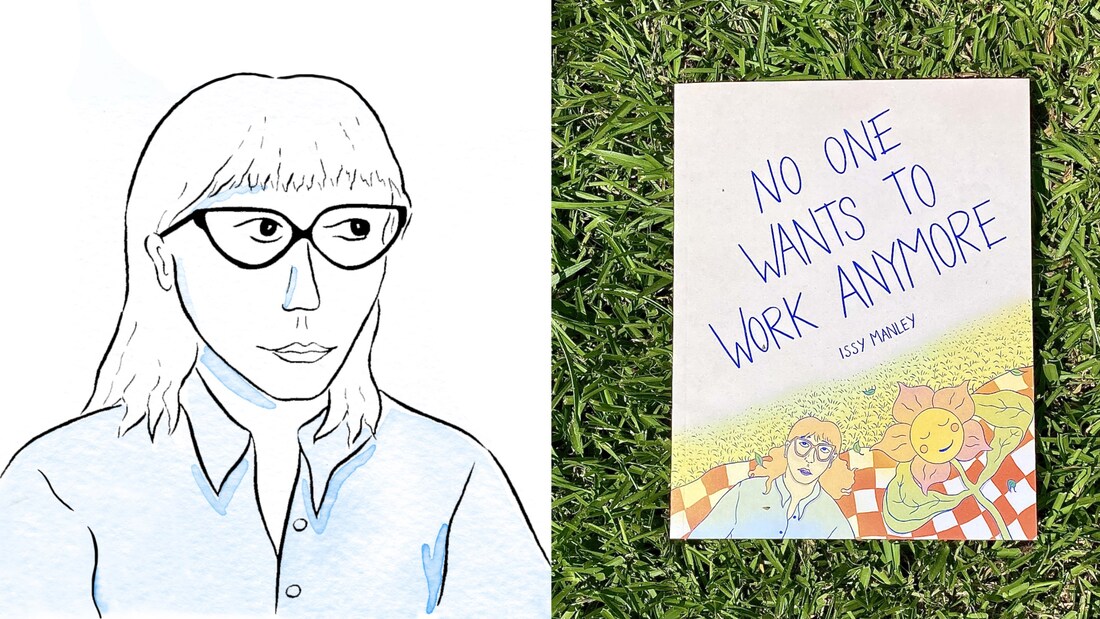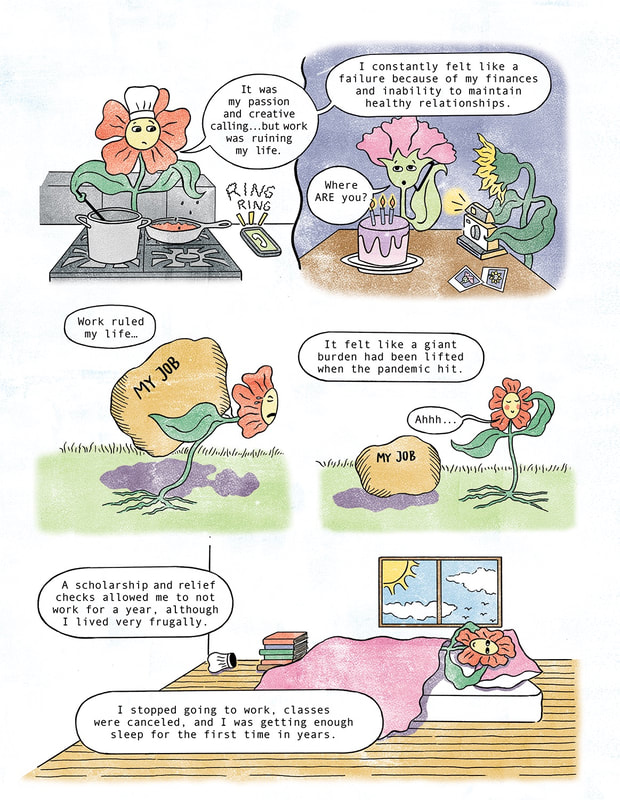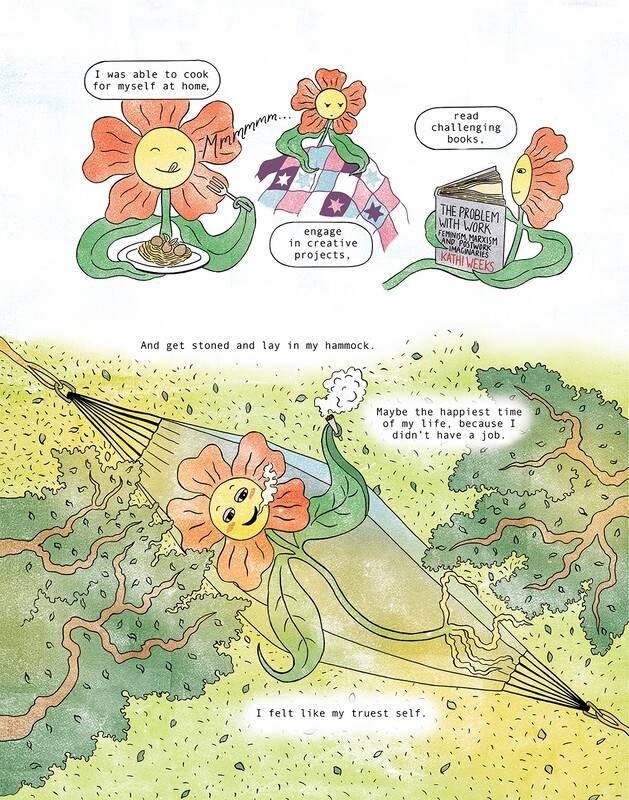Making it work: A new comic collection by Issy Manley
No One Wants to Work Anymore
By Issy Manley
A new collection of personal comics is out by local writer and artist, Issy Manley. It's a look at labor, working in the service industry and the broader context of what work means to people, society and ultimately, the planet. We caught up with Issy to find out more.
Can you summarise the collection for us? What are the main themes?
This is a collection of shorter personal and nonfiction comics, all about work and jobs in the context of either the pandemic or climate crisis. Some of the pieces are more straightforward memoir while others are more research or interview based, but all explore the unnecessarily exploitative and all-consuming nature of waged work. The collection includes comics about working in the service industry in the early months of the pandemic, applying for jobs during the surge in unemployment, and how a widespread reduction in working hours could help mitigate global warming. My favorite comic (and the longest one) includes interviews with a range of workers either about their experiences getting paid to stay home on unemployment benefits, or about how their working conditions were altered by the pandemic. I guess the title - "No One Wants to Work Anymore" - is both ironic (a reference to right-wing complaints about the supposed labor shortage) and very sincere (who wants to return to a job that never valued or sufficiently provided for you in the first place?)
Tell us a bit about the process of making this. It’s a collection, so I assume it grew organically over time?
I graduated from an MFA comics program (The Center for Cartoon studies) in the spring of 2020, and this collection includes most of the longer comics I've made since. I won an open call publishing grant for comics from the Antenna::New Orleans back in 2021, and then decided I wanted to shift my collection to include newer comics on the more cohesive topic of work (Antenna generously grants recipient artists pretty much total creative freedom, in addition to funding and printing their work). During the first months and years of the pandemic, so many of us were experiencing pretty unprecedented changes in and profound realizations about our working lives (especially in New Orleans, where so many people work in service and tourism - industries that totally shut down). Some people in my community were making more money on unemployment than they ever had working grueling, low-wage jobs; others were working from home for the first time; "essential workers" were facing untenable safety risks and deep burnout, while other locals were organizing and protesting to get the city and state to provide much needed financial relief. When these experiences were new, people were talking about them all the time online and casually with friends, but the push (and profit incentive) to 'return to normal' has been so strong most of these memories have quickly faded. I think the impetus for this collection of comics was trying to preserve the emotional impact of working and/or unemployment during the pandemic, and to remember that large scale, radical changes to the way work is structured ARE, in fact, possible, even in America (we lived through them!).
What has been your personal experience of labor/work before, during and after the pandemic? Do you think that it’s a fairly typical one in terms of the general population?
I've worked in the service industry or as a teacher in New Orleans since 2011, two fields many people would identify as pretty exhausting, hard work (even when you enjoy aspects of it). During the pandemic I experienced stints as a 'frontline worker', stayed home on the 'bernie bucks' supplemental unemployment, worked remotely, and then worked in person through several overwhelming covid surges, so I think I got to experience a fairly wide range of pandemic working conditions. Whether you're an hourly, salaried, freelance or gig worker, most people are finding their work is becoming less secure and more unsustainable - especially in New Orleans and Louisiana, with limited labor protections and increasing climate threats. I think my personal experiences of being overworked and underpaid are sadly the norm, especially in care and service work, and especially here.
What got you into graphic novels/comics growing up? What/who would you say your artistic influences are?
I always liked art-making and reading, but wasn't actually particularly into comics (reading or making) as a kid or young adult because there were barely any available in my local library or school. The first graphic novels I loved reading were by the comics-journalist Joe Sacco, who mainly covers war and colonialism; I deeply related to Sacco's work because he used words and pictures to portray trauma (something many people around me were experiencing at the time) in an authentic and humane way. I think there's something about the medium of comics that's especially suited to non-fiction; the interplay of drawing and writing creates space for more nuance and more perspectives on a complex topic, while the brevity makes comics more immediate, precise and accessible.
Where have you been published previously? Where can people find more of your work?
I mostly publish short comics online, in places like The Guardian, The Nib, Popula, The Lily, and Narratively. I post updates on instagram (@issy_mmmm) and you can order my book (if you like!)
You can indeed order the book, from Antenna, right here: https://www.antenna.works/paper-machine/publications/
By Issy Manley
A new collection of personal comics is out by local writer and artist, Issy Manley. It's a look at labor, working in the service industry and the broader context of what work means to people, society and ultimately, the planet. We caught up with Issy to find out more.
Can you summarise the collection for us? What are the main themes?
This is a collection of shorter personal and nonfiction comics, all about work and jobs in the context of either the pandemic or climate crisis. Some of the pieces are more straightforward memoir while others are more research or interview based, but all explore the unnecessarily exploitative and all-consuming nature of waged work. The collection includes comics about working in the service industry in the early months of the pandemic, applying for jobs during the surge in unemployment, and how a widespread reduction in working hours could help mitigate global warming. My favorite comic (and the longest one) includes interviews with a range of workers either about their experiences getting paid to stay home on unemployment benefits, or about how their working conditions were altered by the pandemic. I guess the title - "No One Wants to Work Anymore" - is both ironic (a reference to right-wing complaints about the supposed labor shortage) and very sincere (who wants to return to a job that never valued or sufficiently provided for you in the first place?)
Tell us a bit about the process of making this. It’s a collection, so I assume it grew organically over time?
I graduated from an MFA comics program (The Center for Cartoon studies) in the spring of 2020, and this collection includes most of the longer comics I've made since. I won an open call publishing grant for comics from the Antenna::New Orleans back in 2021, and then decided I wanted to shift my collection to include newer comics on the more cohesive topic of work (Antenna generously grants recipient artists pretty much total creative freedom, in addition to funding and printing their work). During the first months and years of the pandemic, so many of us were experiencing pretty unprecedented changes in and profound realizations about our working lives (especially in New Orleans, where so many people work in service and tourism - industries that totally shut down). Some people in my community were making more money on unemployment than they ever had working grueling, low-wage jobs; others were working from home for the first time; "essential workers" were facing untenable safety risks and deep burnout, while other locals were organizing and protesting to get the city and state to provide much needed financial relief. When these experiences were new, people were talking about them all the time online and casually with friends, but the push (and profit incentive) to 'return to normal' has been so strong most of these memories have quickly faded. I think the impetus for this collection of comics was trying to preserve the emotional impact of working and/or unemployment during the pandemic, and to remember that large scale, radical changes to the way work is structured ARE, in fact, possible, even in America (we lived through them!).
What has been your personal experience of labor/work before, during and after the pandemic? Do you think that it’s a fairly typical one in terms of the general population?
I've worked in the service industry or as a teacher in New Orleans since 2011, two fields many people would identify as pretty exhausting, hard work (even when you enjoy aspects of it). During the pandemic I experienced stints as a 'frontline worker', stayed home on the 'bernie bucks' supplemental unemployment, worked remotely, and then worked in person through several overwhelming covid surges, so I think I got to experience a fairly wide range of pandemic working conditions. Whether you're an hourly, salaried, freelance or gig worker, most people are finding their work is becoming less secure and more unsustainable - especially in New Orleans and Louisiana, with limited labor protections and increasing climate threats. I think my personal experiences of being overworked and underpaid are sadly the norm, especially in care and service work, and especially here.
What got you into graphic novels/comics growing up? What/who would you say your artistic influences are?
I always liked art-making and reading, but wasn't actually particularly into comics (reading or making) as a kid or young adult because there were barely any available in my local library or school. The first graphic novels I loved reading were by the comics-journalist Joe Sacco, who mainly covers war and colonialism; I deeply related to Sacco's work because he used words and pictures to portray trauma (something many people around me were experiencing at the time) in an authentic and humane way. I think there's something about the medium of comics that's especially suited to non-fiction; the interplay of drawing and writing creates space for more nuance and more perspectives on a complex topic, while the brevity makes comics more immediate, precise and accessible.
Where have you been published previously? Where can people find more of your work?
I mostly publish short comics online, in places like The Guardian, The Nib, Popula, The Lily, and Narratively. I post updates on instagram (@issy_mmmm) and you can order my book (if you like!)
You can indeed order the book, from Antenna, right here: https://www.antenna.works/paper-machine/publications/


